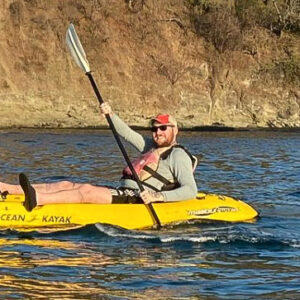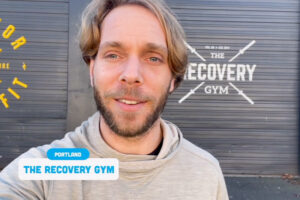Recovery Roundtable: What’s the Most Important Thing in Recovery for You?
There's no wrong answer, but 10 voices of recovery, from a sober travel pro to a rocker turned recovery coach, share what helped them and those they care about succeed

Recovery, alas, is not quite as simple as flipping off a big “addiction” switch in your brain. Most people need a strong support network, new tools to promote emotional well-being, a suite of recovery resources, a recalibration of life goals, new activities and a new awareness of what makes them tick (and makes them mad). For starters.
But if you could identify one thing that helped most, what would it be? That’s what we asked 10 stars of the recovery world, including sober artists, influencers and entrepreneurs, as well as addiction treatment professionals. Some emphasized connections and relationships in recovery, others highlighted self-care, and a few stressed the necessity of living with purpose, direction and intention.
Finding the combination that works for you is key, and “what needs to be said could fill a hefty book,” one interviewee noted. But they shared what they considered must-haves, in in the latest installment of our Recovery Roundtable series. (Responses have been edited for length and clarity.)
All Sober: What’s been the most important factor for your success in recovery? Or, what do you consider the most important factor in recovery generally?
Cole Bressler | Founder, Choose Life Sober Adventures, which organizes group tours for travelers in recovery

Obviously travel and the outdoors is hugely important to us. That’s why we do what we do. But I think the main thing about that that’s even more important than the travel or the outdoors — it’s important in anything you do in recovery — is the people you do it with, right?
What I always say is, being outside, doing this stuff, that’s what I love to do. But when I’m just out there by myself, I can just as easily be thinking of something else, completely obsessing about whatever bullshit I normally obsess about.
But when I’m actually connecting with another human being, and the travel is just the conduit for that, then I’m truly in the moment. And it’s actually impossible to think about drinking, to think about what you’re anxious about, when you’re legitimately present with another human being. Addiction is a very solitary, isolating thing, and you kind of have to go in the other direction of that.
So that is really what I have found is the most important thing: The connection between people, the community we’ve built.
Priscilla María Gutiérrez | Trauma recovery coach and speaker, founder of Cycle Breaker Coach
Establishing a “why” was a game-changer for me, because up until that point, I wasn’t ready. But once I established a “why,” I was able to stick to my sobriety.
Prior to my sobriety, self-care was not in the picture, but now that I’m sober, I make it a daily priority. I realized during sobriety that alcohol was not the only toxic thing that I was putting around my body or into my body. So now I’m mindful of the food I eat, the company I keep and what I pour my energy into.
Kevin Hyer | Labor attorney and founder of The Hyer Calling Foundation, a nonprofit that helps people in recovery return to work and achieve career goals

In my recovery from methamphetamine use disorder, the most important factor for my success has been what I call the recovery trifecta: 1) purpose, 2) meaning and 3) gratitude.
I derive a tremendous amount of purpose from leading The Hyer Calling Foundation. Before I formed Hyer Calling I had a 10-year run as an employment lawyer. I am still a lawyer, but I now use my background to help give the recovery community a second chance at a career and educate businesses on why our community makes such great employees!
I get a lot of meaning from that because I am trying to “stamp out” the disease of addiction like we did smallpox. I realize that isn’t really practical but it’s how I see my work, and I get tremendous satisfaction from it. This disease is nothing less than heartbreaking. We simply must address it.
Lastly, I am incredibly grateful to have been given a second chance at professional redemption. I made a mistake, caught up in a moment of insecurity as I found myself dangerously close to 40. At the time, I had no history of drug use. Life comes at you fast. I felt like I deserved a second chance, and I got it. I’m now trying to give that same gift to others. As they say in recovery circles, we can only keep what we have by giving it away!
Ian Jackson, LPC-MHSP, NCC | Clinical director, Recovery Unplugged Treatment Center | Brentwood, Tennessee

I will say the most important factor in recovery is “aligning your actions with your intentions.” In life, when we have goals that we want to achieve, it is an intention. The only way that we can make that goal or that dream come true is with actions that are in direct alignment with that goal/intention. When we are living a life in which actions and intentions are completely parallel at all times — I believe fulfillment lives inside that space.
Fulfillment is a level of happiness that is much more long-lasting, because it is a state of mind of knowing that I am carrying out my goals and dreams. When our actions do not align with our intentions, it opens up space for shame, guilt, sadness and the list goes on.
Kristina Canfield, M.Ed. | Executive director, Association of Recovery in Higher Education (ARHE), which supports and helps develop collegiate recovery programs nationwide

I think this is different for everyone and no two people’s journeys look exactly the same. And that’s OK! I also think this changes over time as we grow and change.
My focus in the last several years has been my mental health. I had to get really honest with myself and others that despite years of recovery, I was struggling with depression, and it was making my life unmanageable.
It was hard to reach out for that help, but it has made all the difference.
Chas Smith, aka Colicchie | Hip-hop artist who raps unflinchingly about addiction, recovery and mental health

I believe in seasons. What was appropriate for one phase of recovery might not be for another.
For me, the beginning was really about meetings and hanging out with friends, because I hadn’t done that in so long. Eventually, it became about 12-step work and then sponsoring other people. Even when I get caught up in my own insanity, helping others has been the best way for me to get out of my own head.
But if I had to pick one thing, my relationship with God has been the biggest thing that has sustained me in my recovery.
Kristen McAvoy | Founder of sober social media community Sober Girl Tribe
I would say the most important thing in recovery is community. Having people who are going through similar experiences as you and who you can relate to is so important. You don’t have to do this alone. There are so many support groups online and in person where you can connect with other people and have support during this journey.
David G. | Licensed counselor working in substance use disorder counseling at Connections Wellness Group, headquartered in Denton, Texas
In a word, ACTION! Addiction and all that accompanies that life is not a passive state. People work hard in service to their addictions, and so recovery and its processes must be just as dynamic. It takes lots of people and many moving parts for a person to live out an addictive lifestyle; and so, recovery, particularly early recovery, requires just as many resources. Yet too many people attempt a recovery process alone or nearly alone.
Once the initial actions that bring success are identified, they must then be exercised every day. This is the work of recovery that brings success. The rest of what needs to be said could fill a hefty book, but the simple answer to this question is, again, action.
Sarah Gilman, LCSW | Director of clinical services, Malvern Treatment Centers, Willow Grove Campus | Willow Grove, Pennsylvania

The most important factor in a successful recovery journey, is the internal motivation to choose a path of recovery, followed by building your own unique and robust support system.
Personal goals contribute to a successful recovery, as working toward a passion can give purpose. This creates a sense of empowerment and taking back control over one’s own life. Developing your own “recovery mission statement” will get you focused on your unique recovery journey and looking for the small but positive steps taken each day. Possessing goals that are self-directed promotes a sense of responsibility and accountability to manage thoughts, feelings and behaviors that support the recovery process.
Remember that to [emphasize] positive thinking, keep the 1:3 ratio in mind: For any negative self-thought, try to come up with three things you have done that promoted recovery. This small habit builds your recovery muscle and begins to change your focus.
Ricky Byrd, CASAC-T, CARC | Former guitarist with Joan Jett & the Blackhearts, Rock & Roll Hall of Fame inductee and recovery coach; recent solo albums include “Sobering Times” and “Clean Getaway”

I still basically do the same things I did when I came into recovery 35 years ago. Maybe not as many meetings, but I “keep it green,” as they say. I sponsor others and have a 12-step sponsor. I try to help others struggling. I am always involved with something that has to do with recovery, along with all the other things I do. Right now I’m working with All Sober to get the word out there and reduce the stigma that still exists.
What worked for me might not be a fit for someone else, but there are many different paths to recovery these days, and I truly believe whatever keeps you on “the right side of the grass” is a good thing. We can and do recover: That’s my message.
More Lifestyle
The Definitive Guide to Sober Travel
Vacations shouldn't be nerve-racking, but in recovery, it's not always that simple. We asked three sober travel pros how to make your trips fun — and more fulfilling than ever.
Sure-Bet Sober Date Ideas
Ready to get back out there? Sober dating isn't so hard. But here are a few pointers anyway, to help you find your groove.
Sobriety Roundtable: What's Your Favorite Sober Activity?
From roller derby to CrossFit and dog fostering to splurging on Mexican, nine sober folks shared what they do for fun and fulfillment. Get some ideas for your own Dry January or longer-term sobriety!
The Joy of Baking (Sober)
Two months sober, Annie Zimmerman decided to make cookies. Now, her hobby turned passion yields fulfillment, connection and delicious soberversary cakes. Read the interview!
Now Elite NFL Players, They First Tackled Addiction | News Roundup
All Sober compiles the best of the latest headlines. Here's your addiction and recovery news for the week of Feb. 19, 2024!
All Sober in Chicago
A great town for recovery, come sun, rain or snow! Check out our video guide to the Windy City's best sober options for bars, bottle shops — and even an arcade with vintage games.
All Sober in New York
The Big Apple truly has it all — including a sober bar with a "witchy vibe" and an array of enchanting non-alc cocktails. Take a peek in our video guide to the sober city!
All Sober in Portland
Oregon's cultural capital may be weird and proud, but it's sober and proud too! We scoped out the coolest sober-friendly spots in our new video guide.










